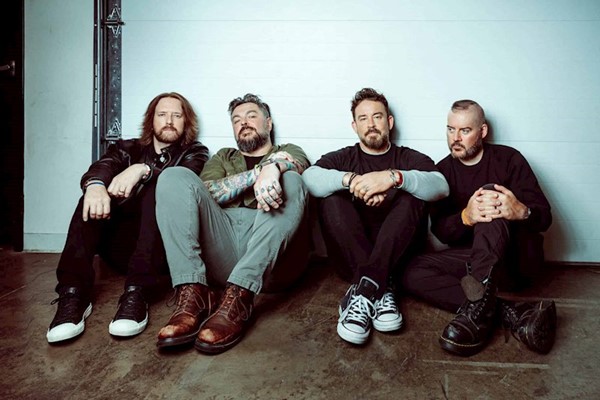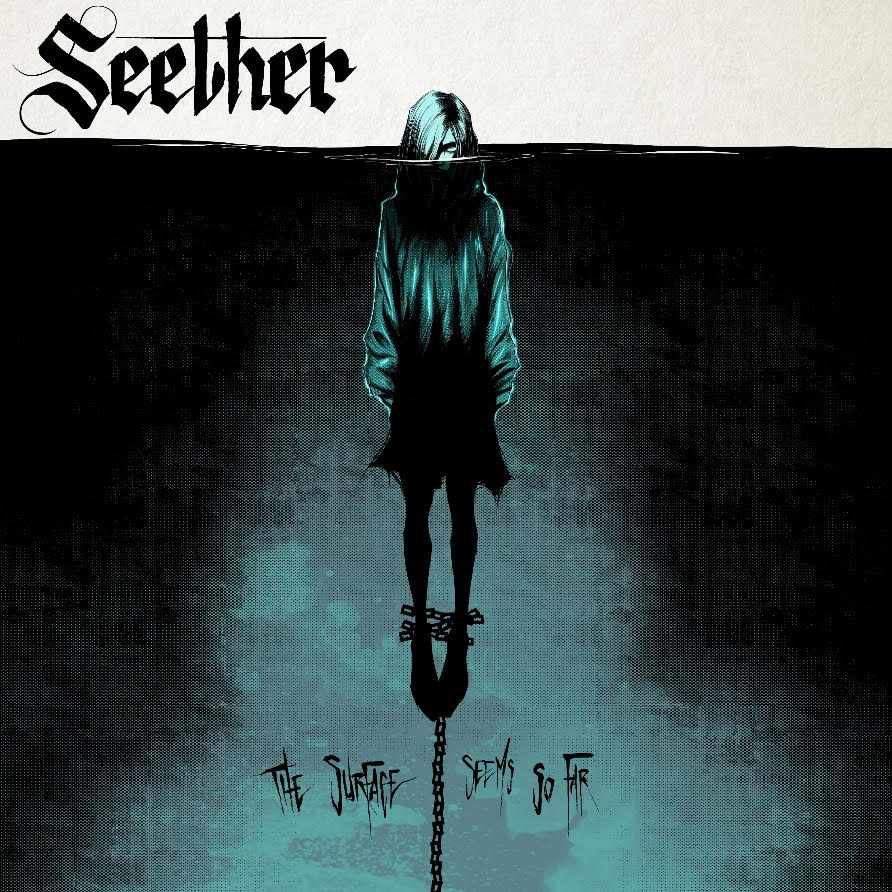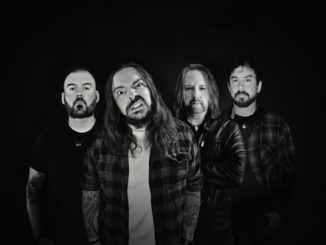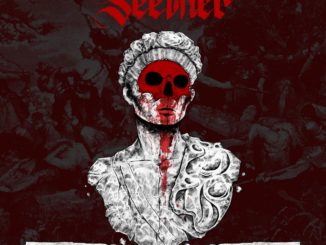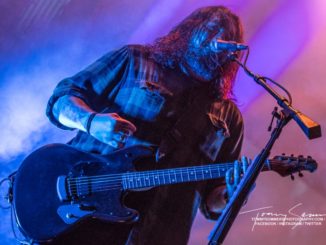Seether are set to release their 9th studio album “The Surface Seems So Far” on Friday September 20 via Fantasy Records. I got to sit down and chat with bassist Dale Stewart to talk about the album, the creative process and how Shaun Morgan put producer hat on for this record. In 2020’s “Si Vis Pacem, Para Bellum” didn’t get the touring opportunities due to the state of the world. Instead, the band took some time to write for this album and clearly have had a few things to say through this collection of songs.
Andrew : Hello, Dale. How are you? First and foremost, welcome to Australia and welcome to The Rockpit. It’s great to be talking to you.
Dale : Yeah, I’m not too bad, man. Very good, it’s great to speak with you too.
Andrew : Congratulations on the new album “The Surface Seems So Far”, which is out September 20 via Fantasy Records. It really is a great, engaging listen. The lead single ‘Judas Mind’ is just a monster of a track. How far into the writing process did that track come about?
Dale : I want to say that was one of the earlier songs in this session. It’s kind of hard to say because we live quite far apart. There were lots of emails back and forth with music and ideas and songs and demos and things like that. I think that one from the start we definitely knew it was kind of a special song and was going to be a single at some point. Just you never really know when, but I think it’s kind of cool to come out of the gate with a little bit of a ripper to get people’s attention; especially after being away for a while.
Andrew : Well, it certainly does come out swinging. For me it was just like, wow, this is has an energy to it and it kicks ass. It certainly built my anticipation for the album, which I have had the absolute pleasure of hearing. How has the public reaction been to ‘Judas Mind’ so far?
Dale : It’s been pretty positive so far. As far as I can tell. Radio stations are stateside where Sean and I both live now. They’ve been pretty eager to pick it up. It’s been getting decent spins online as well, and everything we’ve heard has been positive. So that’s really all you can hope for. It’s such a weird time now, all the sort of metrics that you would judge a song by have kind of changed. But yeah, if you look at Spotify numbers, YouTube and radio spins, it’s pretty good, man. So nice to know that after twenty something years people still care.
Andrew : In this day and age, I think that’s the thing, having people coming back with each release. The beauty about Seether is that the band has always stayed very true to its style, to the kind of rock music that you put out there.
Dale : Yeah, I think so. So many trends sort of come and go and we’ve weathered a lot of storms, so to speak. We’ve never tried to jump on any bandwagons or capitalize on any sort of trends and I think people appreciate that. We’re not trying to reinvent the wheel; we just do what we do. We love music. We play the music we’d want to hear. We’re just like an old-fashioned rock band kicking over beer bottles and sweating it up on stage and having a good time with it.
Andrew : The other thing that really appealed to me with “The Surface Seems So Far” is that stylistically, the album doesn’t lock itself into one style. For somebody like myself who’s been a rock fan for decades the album seems to take us on a very, very solid trip down memory lane of the last two and a half decades. There is a distinct hint of grunge, alternative radio rock, nu-metal and hard rock. Was that something intentional? I think you almost answered it before in sort of saying that it just naturally. Was that something that was conscious or was that something that as you said before you came about from playing the music you like to hear?
Dale : I don’t think we ever set out to make something that’s going to specifically sound a certain way, we write music that’s going to have a certain feel. It is just however it ends up sounding. If we like it and we’re feeling good about it, we’ll put it on the album basically. I think it’s hard if you’re trying to make a record sound a certain way, okay, this one’s got to be heavy, and then now you’ve kind of pigeonholed yourself into, okay, well let’s scrap that idea because it doesn’t fall within this framework that we’re trying to work with. I think if anything, you do yourself a bit of a disservice, at least in a band like this. But yeah, we just do what we do and there’s no real conscious effort and it’s just kind of a snapshot in time of where we are as a band at that time. Also, now with Sean producing the albums, it’s full-on old school garage days for us too. There’s no producer over your shoulder, and I feel like, no disrespect to any of the producers we worked with, we’ve worked with some great guys, but I feel like there’s always this effort to, not dumb things down necessarily, but just keep things maybe a little bit more radio friendly, whether it’s guitar tones or just the song in general. I feel like it’s their job to reel you in when you start getting a little bit rowdy, probably on orders from the label. But when it’s just us in the studio and Sean’s producing, it’s like garage days. It’s like whatever we want to do, we do it. If we want to get heavy, if we want to get crazy, we go for it. There’s no one sort of pumping the brakes; if we want to do something completely chill and slow and mellow and like a crazy ballad, then we can do that too, there are no real rules, we have that freedom, which it’s nice.
Andrew : So it’s been four years between records and I mean between “Si Vis Pacem, Para Bellum” and this one. What would you say would be the biggest difference between the two?
Dale : Man, it’s so crazy. “Para Bellum” we finished recording it right as covid started to hit. We started hearing rumblings of this weird thing that’s happening and we’re like, oh, great, we’ve just got this album. We’re getting ready to release a single, are we going to be able to tour? It was this whole crazy thing. So that really threw a giant spanner in the works. We didn’t really get to tour. We had to try and be creative, being told we couldn’t tour, and we didn’t know how long it was going to last or if we ever could again. It was a frustrating time, and I think a lot of the angst and the sort of anger in this new album comes from, a lot of it comes from that frustration and just uncertainty of that time. I don’t want to throw a giant pity party because everyone had a rough go during the Covid stuff, but when your life is music and they kind of pull the rope it really kind of messes with you a little bit. I think that’s where a lot of the world really kind of changed during that time, and I definitely think it’s reflected in the music. Definitely lyrically with Sean, it’s definitely a diary for him. “Para Bellum” was a pretty angry album too, but I don’t know if it had quite the vinegar or the, I don’t know, I don’t want to say it was a pessimistic album, but I think this new album is quite dark, but it is that as a way to deal with things to get it out of your system. So, if you can purge all those feelings, then in your personal life, you can feel somewhat normal if you put it in a song and it’s like writing it on a piece of paper and burning and watching the smoke flow up into the sky and you feel that relief and that release. That’s kind of what it’s like when you put a song out. It’s like watching the smoke up and just feeling the pressure kind of release out of your body.
Andrew : Given the pandemic happening at the time of the last album, the world shut down for 18 months. How quickly did you get into writing “The Surface Seems So Far”?
Dale : It was pretty soon. I mean, there’s really nothing else to do if you can’t go out and tour. You just kind of, I guess stay home and then jam on the guitar and try and come up with ideas and stuff. It’s hard for a touring band to be stuck at home as much as when you’re on the road, all you want to do is go home and see your family. And still, when you can’t tour, you realize how much of a part of your life it is. I mean, the creation of the music and the writing and the recording processes rewarding in itself, obviously. It’s a huge part of what we do. Being stuck at home, we have never had so much time off, we’ve always toured, we’ve been road dogs for so long, so maybe in hindsight, being forced to be home was maybe even a bit of a blessing. We really got to spend a lot of quality family time. I had two kids come out of the Covid lockdown. I mean, what else are you going to do? (laughs) I’m a dad now and I absolutely love it. So maybe it was a blessing just to be home and be able to take time and be with family and work on new material and not feel rushed in doing that and now it’s all open again now and we’re starting to tour again. With that there’s a new fun enthusiasm, because you know what it’s like to not be able to do it. You appreciate it more now that you can do it.
Andrew : “Para Bellum” had a second life so to speak through an expanded version of the album. Were there also a bunch of songs that were written for “The Surface Seems So Far?” that didn’t make the 11 final tracks?
Dale : Yes absolutely. We always record a couple extras just in case. I think we had 16 in total on this album, well, on this recording session. Some of those songs might never see the light of day. Some of those songs might end up being B-sides or whatever on a European release, or maybe we’ll submit something for a video game or a movie or something like that. We always just record a couple extras. It is just good to have those to choose from because until the songs are in their final form, it’s hard to really make the final selection. Once they’re all recorded, then we come together and as individual band guys, we’ll each make our little list. Okay, well these are the 11 that I think are the best. And okay, what do you think? And then we talk to the label and management, kind of cross-reference with everyone and see what everyone thinks. That’s how we wind it down to the album tracks.
Andrew : In this day and age the way that a lot of people consume music has changed through streaming, Spotify, iTunes, all of those sorts of things. It seems as though the business 101 these days is to continuously every six to eight weeks drop a single. Are there any particular tracks on this album that you think are essential tracks/singles?
Dale : There’s definitely one song called ‘Walls Come Down’, I’ve got a lot of faith in that song. It was probably my favourite since very early on. It’s a driving song, a little bit repetitive, but I don’t think to the point where you get sick of it. I think just the point where it’s kind of, it’s catchy, at least I hope so.
Andrew : It is catchy as hell. It’s actually one of my favourite tracks on the record.
Dale : Great; I had hoped it’s just not me (laughs) I really have a lot of faith in that song. There was talk about why don’t we put ‘Walls Come Down’ out as the first single? I was just never comfortable with that. I thought a song like that you want kind of wait, you don’t want to come out with what could be the strongest single. Hopefully it is, but you don’t want to come out with that first. You want to have that as maybe the second or third and kind of just keep something in the tank.
Andrew : I think it potential to be a massive single for you guys.
Dale : I think so and I hope so. I think it’s definitely going to be a single, just when is the question. But, if I were to pick one song from the album, I’d say ‘Walls Come Down’ is the one I’m really excited to release.
Andrew : Yeah, I think for me, I mean ‘Try To Heal’, ‘Illusion’ and ‘Semblance Of Me’ are just insanely good. ‘Dead On The Vine’ just has this thing, I just found myself involuntarily sort of rocking out to it when I first heard it. I went, man, this connects. You’d probably understand that feeling when you hear something and you just say, there it is, you get that vibe and that groove from an album standpoint,
Dale : That’s the goal. That’s great.
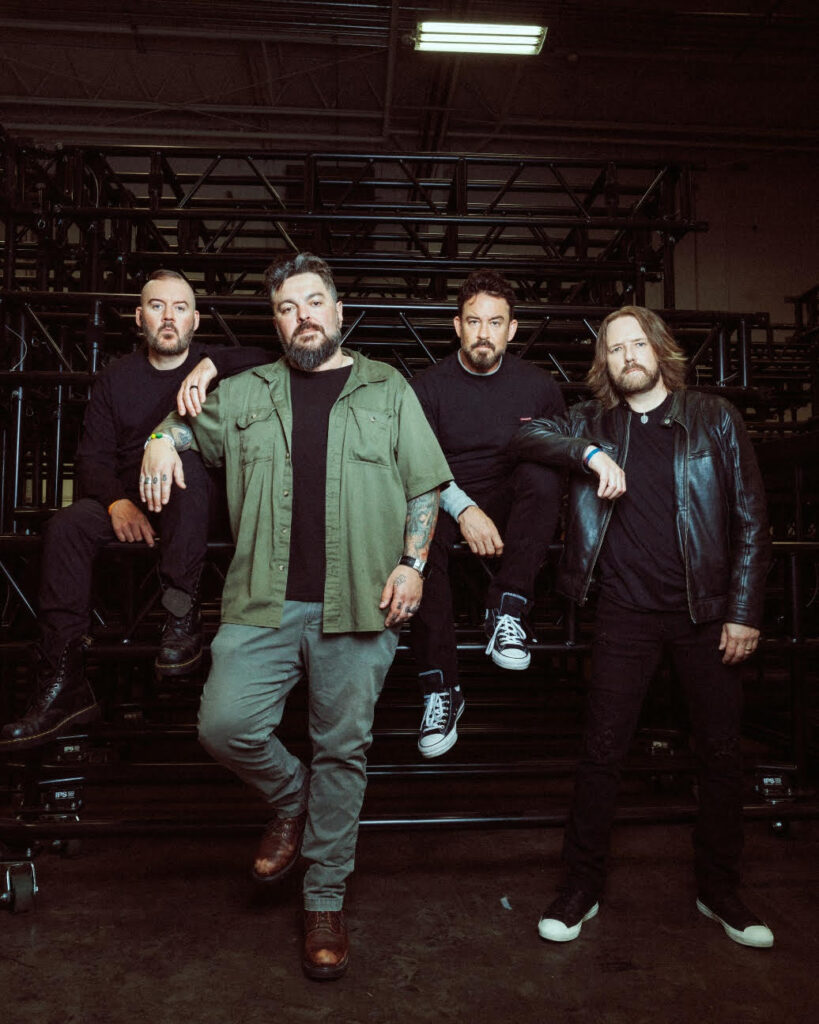
Andrew : Being a music fan and spending decades consuming and inhaling all kinds of music, there are certain things that you go WOW to; those moments where you go that’s quite a cool mix of styles. I know it’s probably not intentional and it’s probably the result of some influences, but with ‘Beneath the Veil’, I’m sitting there and I’m going, what does this remind me of? And it’s a cross between Kurt Cobain and Keenan from Tool in the vocal performance. I’m thinking this is such an interesting mix, and it works so well. As an album, I think it’s fresh in what it does. I mentioned it was familiar in some ways, yet it’s also very, very fresh. So please don’t take the familiar as an insult.
Dale : No, that’s a very positive thing to hear. It’s high praise. Absolutely. Thank you.
Andrew : Performance wise was there a standout from each member on a particular track for you personally?
Dale : I don’t know. I can’t really say, the whole session kind of bleeds together. We worked so fast; we knocked out really quickly. We went to Nashville to do the first session, and we did all the drums and all the bass for 16 tracks in I think three days, four days (laughs). Something like that. I think it was four days. We worked at a feverish pace, so we didn’t really have a lot of time to sit around and think too much about things. We were just really stuck in and getting it done. We had a bit of a winter storm roll in at that time, so we went home, and we reconvened a couple of weeks later and finished it up. I don’t know if I can point to anything in particular. I just think as a band, we’ve been in the studio so much now and recorded so much material, I think we’re just getting really good at what we do. I think we’re pretty professional in there. We have a good work ethic and we’re not scared to put in the long hours. Obviously with things like pro tools and these new technologies make it so easy to record. You don’t have to splice tape. With Pro Tools, some people hate it, some people love it. I think it’s great as long as you don’t abuse it and make things sound obviously processed, fake or mechanical. There’s a way to use it responsibly and still make good proper rock music. It just makes it easier to do it that way and I think we’re all just getting really good at what we do in the studio.
Andrew : Just a really quick one to wrap it all up as we are out of time. I’m an old school guy. I love buying my physical product. I love buying my CD’s and my Vinyl. It all serves a purpose for me. I’m assuming that there are going to be pre-sales for the physical product and there will be variants available. And how do we go about tracking these down?
Dale : I think the best way would be to just go on our website, www.seether.com. All the information should be up there for people to check out for pre-sales. I’m not sure exactly what the plan is on that stuff, but the website will definitely have a lot more information than I do at this moment.
Andrew : Perfect. I hate that we have to cut this short because I could chat for ages with you.
Thank you so much for your time. Congratulations on an amazing album. Hopefully we see you guys out here in Australia in the near future.
Dale : Yeah, no worries. I appreciate that. Nice talking to you Andrew. Hopefully we will get to Australia soon. Have a great day.

